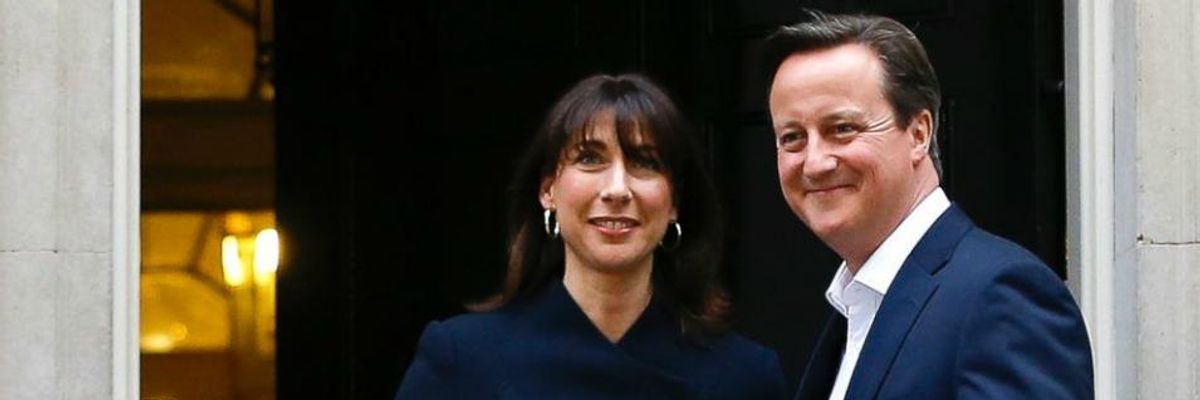
Britain's Prime Minister David Cameron and his wife Samantha return to 10 Downing Street in London, May 8, 2015. (Photo: Kirsty Wigglesworth/AP)
To donate by check, phone, or other method, see our More Ways to Give page.

Britain's Prime Minister David Cameron and his wife Samantha return to 10 Downing Street in London, May 8, 2015. (Photo: Kirsty Wigglesworth/AP)
Thursday's United Kingdom elections brought a surprise lurch to the right, with the Conservative Party seizing the majority of Parliamentary seats and Prime Minister David Cameron sweeping back to power with more muscle behind him this time.
The overwhelming win was unexpected, as polls ahead of the election had shown a close race with the opposition Labour Party, and many analysts had expected a hung parliament in the immediate aftermath.
But both the centrist liberal democrats and Labour Party were clobbered in the election, prompting Labour Party leader Ed Miliband to resign from his role.
Cameron immediately signaled that he plans to oppose independence for Scotland and Wales. "I want my party, and I hope a government that I would like to lead, to reclaim a mantle that we should never have lost--the mantle of one nation, one United Kingdom," he said on Friday.
However, the Scottish Nationalist Party--anti-nuclear, anti-austerity, and pro-independence--made considerable gains, jumping from just six seats to 56.
The Guardian reports:
At the time of writing, with almost all 650 seats declared, the Conservatives had 325, Labour 229, the SNP 56 and the Liberal Democrats eight. In practice 323 Members of Parliament is the number needed to form a majority government.
"It is an extraordinary statement of intent from the people of Scotland," said SNP leader Alex Salmond. "The Scottish lion has roared this morning across the country."
Trump and Musk are on an unconstitutional rampage, aiming for virtually every corner of the federal government. These two right-wing billionaires are targeting nurses, scientists, teachers, daycare providers, judges, veterans, air traffic controllers, and nuclear safety inspectors. No one is safe. The food stamps program, Social Security, Medicare, and Medicaid are next. It’s an unprecedented disaster and a five-alarm fire, but there will be a reckoning. The people did not vote for this. The American people do not want this dystopian hellscape that hides behind claims of “efficiency.” Still, in reality, it is all a giveaway to corporate interests and the libertarian dreams of far-right oligarchs like Musk. Common Dreams is playing a vital role by reporting day and night on this orgy of corruption and greed, as well as what everyday people can do to organize and fight back. As a people-powered nonprofit news outlet, we cover issues the corporate media never will, but we can only continue with our readers’ support. |
Thursday's United Kingdom elections brought a surprise lurch to the right, with the Conservative Party seizing the majority of Parliamentary seats and Prime Minister David Cameron sweeping back to power with more muscle behind him this time.
The overwhelming win was unexpected, as polls ahead of the election had shown a close race with the opposition Labour Party, and many analysts had expected a hung parliament in the immediate aftermath.
But both the centrist liberal democrats and Labour Party were clobbered in the election, prompting Labour Party leader Ed Miliband to resign from his role.
Cameron immediately signaled that he plans to oppose independence for Scotland and Wales. "I want my party, and I hope a government that I would like to lead, to reclaim a mantle that we should never have lost--the mantle of one nation, one United Kingdom," he said on Friday.
However, the Scottish Nationalist Party--anti-nuclear, anti-austerity, and pro-independence--made considerable gains, jumping from just six seats to 56.
The Guardian reports:
At the time of writing, with almost all 650 seats declared, the Conservatives had 325, Labour 229, the SNP 56 and the Liberal Democrats eight. In practice 323 Members of Parliament is the number needed to form a majority government.
"It is an extraordinary statement of intent from the people of Scotland," said SNP leader Alex Salmond. "The Scottish lion has roared this morning across the country."
Thursday's United Kingdom elections brought a surprise lurch to the right, with the Conservative Party seizing the majority of Parliamentary seats and Prime Minister David Cameron sweeping back to power with more muscle behind him this time.
The overwhelming win was unexpected, as polls ahead of the election had shown a close race with the opposition Labour Party, and many analysts had expected a hung parliament in the immediate aftermath.
But both the centrist liberal democrats and Labour Party were clobbered in the election, prompting Labour Party leader Ed Miliband to resign from his role.
Cameron immediately signaled that he plans to oppose independence for Scotland and Wales. "I want my party, and I hope a government that I would like to lead, to reclaim a mantle that we should never have lost--the mantle of one nation, one United Kingdom," he said on Friday.
However, the Scottish Nationalist Party--anti-nuclear, anti-austerity, and pro-independence--made considerable gains, jumping from just six seats to 56.
The Guardian reports:
At the time of writing, with almost all 650 seats declared, the Conservatives had 325, Labour 229, the SNP 56 and the Liberal Democrats eight. In practice 323 Members of Parliament is the number needed to form a majority government.
"It is an extraordinary statement of intent from the people of Scotland," said SNP leader Alex Salmond. "The Scottish lion has roared this morning across the country."